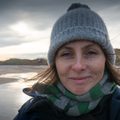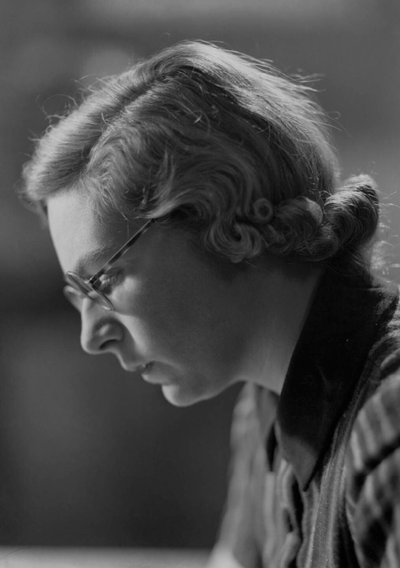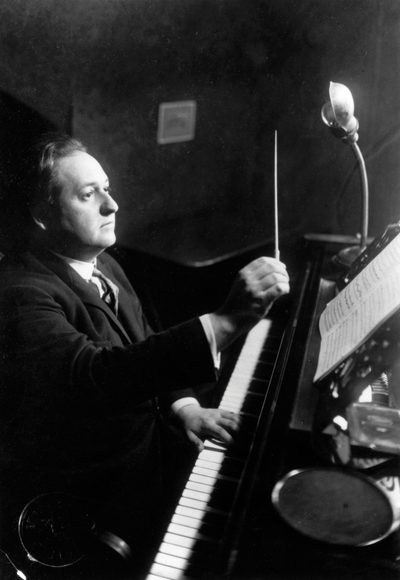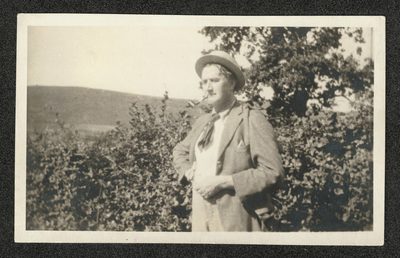
LSO: Vaughan Williams’s A Sea Symphony
LSO: Vaughan Williams’s A Sea Symphony
Celebrate 20th-century British treasures from Elizabeth Maconchy to Ralph Vaughan Williams performed by the London Symphony Orchestra (LSO).
Join the London Symphony Orchestra and their new Chief Conductor, Sir Antonio Pappano, for this celebration of early 20th-century works.
The concert opens with the dreamlike Nocturne for Orchestra by Elizabeth Maconchy. A former student of Ralph Vaughan Williams, Maconchy has been described as ‘one of the most substantial composers these islands have yet produced’ (The Independent). The Nocturne is performed alongside Erich Korngold's Violin Concerto, which finds inspiration from melodies of 1930s Hollywood. Virtuoso violinist Vilde Frang, hailed by The Arts Desk as the 'reigning queen of [the] concerto', performs the solo.
The evening is brought to a powerful close with Vaughan Williams’s A Sea Symphony: a euphoric portrayal of the ocean’s strength and beauty. The Edinburgh Festival Chorus and award-winning soloists Natalya Romaniw and Will Liverman add their celebrated vocals.
Listen on Soundcloud or Spotify.
This performance features the Edinburgh Festival Chorus. In 2025, the Edinburgh Festival Chorus celebrates 60 years at the heart of the International Festival. Listen to a special episode of The Warm Up, where Festival Director Nicola Benedetti and Chorus Director James Grossmith reflect on 60 years of incredible dedication and stirring performances.
Supported by Edinburgh International Festival Endowment Fund
and Geoff and Mary Ball
with additional support from the Consulate General of Italy and the Italian Institute of Culture in Edinburgh
Programme
A keepsake freesheet is available at the venue for this performance.
Full programme
Maconchy Nocturne for Orchestra
Korngold Violin Concerto in D, Op.35
Vaughan Williams Symphony No.1 ‘A Sea Symphony’
Sung in English with surtitles
Performers
CloseOpen
- London Symphony Orchestra
- Sir Antonio PappanoConductor
- Edinburgh Festival Chorus
- James GrossmithChorus Director
- Vilde FrangViolin
- Natalya RomaniwSoprano
- Will LivermanBaritone
London Symphony OrchestraCloseOpen
- ConductorSir Antonio Pappano
- Conductor EmeritusSir Simon Rattle
- Principal Guest ConductorsGianandrea Noseda
François-Xavier Roth - Associate ArtistsBarbara Hannigan
André J Thomas - Conductor LaureateMichael Tilson Thomas
- First ViolinBenjamin Gilmore, Leader
Choha Kim
Savva Zverev
Clare Duckworth
Ginette Decuyper
Laura Dixon
Maxine Kwok
William Melvin
Stefano Mengoli
Claire Parfitt
Harriet Rayfield
Sylvain Vasseur
Richard Blayden
Dániel Mészöly
Hilary Jane Parker
Shoshanah Sievers - Second ViolinJulián Gil Rodríguez
Miya Väisänen
David Ballesteros
Helena Buckie
Matthew Gardner
Naoko Keatley
Alix Lagasse
Belinda McFarlane
Iwona Muszynska
Csilla Pogány
Andrew Pollock
Paul Robson
Polina Makhina
Djumash Poulsen - ViolaEivind Ringstad
Gillianne Haddow
Malcolm Johnston
Thomas Beer
Germán Clavijo
Steve Doman
Julia O'Riordan
Sofia Silva Sousa
Robert Turner
Mizuho Ueyama
Nancy Johnson
Annie-May Page - CelloDavid Cohen
Laure Le Dantec
Alastair Blayden
Salvador Bolón
Daniel Gardner
Amanda Truelove
Anna Beryl
Judith Fleet
Henry Hargreaves
Joanna Twaddle - Double BassRodrigo Moro Martín
Ville Vaatainen
Patrick Laurence
Thomas Goodman
Charles Campbell-Peek
Hugh Sparrow
Jim Vanderspar
Adam Wynter - FluteGareth Davies
Anna Wolstenholme
Imogen Royce - PiccoloPatricia Moynihan
- OboeJuliana Koch
Olivier Stankiewicz (Group C)
Rosie Jenkins - Cor AnglaisAlice Barat
- ClarinetChris Richards
Chi-Yu Mo
Bethany Crouch - Bass ClarinetFerran Garcerà Perelló
- BassoonRachel Gough
Daniel Jemison
Joost Bosdijk - Contra BassoonMartin Field
- HornDiego Incertis Sánchez
Timothy Jones
Angela Barnes
Daniel Curzon
Jonathan Maloney - TrumpetJames Fountain
Gareth Small
Adam Wright
Imogen Whitehead - TromboneSimon Johnson
Rebecca Smith
Jonathan Hollick - Bass TrombonePaul Milner
- TubaBen Thomson
- TimpaniNigel Thomas
Patrick King - PercussionNeil Percy
David Jackson
Sam Walton - HarpBryn Lewis
Anneke Hodnett - CelesteElizabeth Burley
- OrganRichard Gowers
Edinburgh Festival ChorusCloseOpen
- Chorus DirectorJames Grossmith
- Soprano 1Val Beattie
Carol-Anne Burnett
Louise Cameron
Simona Cenci
Annette Chapman
Andrea Kocsis
Katherine Craig
Louise Cunningham
Lisa Dawson
Tanith Donnelly
Maggie Gilchrist
Clare Hewitt
Lorna Holl
Pippa Innes
Talitha Kearey
Natsuko Mortimer
Nina MacDonald-Lewis
Louise McGregor
Morag Michael
Kat Preston-Hynd
Alison Pryce-Jones
Lynn Strang
Ros Sutherland
Jennifer Swan
Lesley Walker
Roberta Yule - Soprano 2Emma Aitken
Anne Backhouse
Emily Borthwick
Susan Bowden
Rhona Brown
Deborah Buckingham
Rachael Cartwright
Esther Chuang
Kathryn Coad
Margaret Cumming
Rosamund Davidson
Dorothy Fairweather
Jane Gilhooly
Carol Haley
Leila Inglis
Lesley Johnston
Rachael King
Maggie Kinnes
Debbie Logan
Janet McKenzie
Emily McLeish
Kathy Miller
Katharine Oyler
Katharine Relph
Sally Sandground
Kirsten Stuart
Karen Traill
Federica Vian
Molly Wallbanks
Kathy White - Alto 1Moira Allingham
Ruth Bowen
Barbara Brodie
Jessica Brown
Yvonne Connell
Susan Crosby
Catherine Dunlop
Kirstie Fairnie
Rona Gray
Anne Grindley
Jane MacLeod
Frances McGlashan
Linda McLauchlan
Fiona Milligan
Tatiana Malikova
Nicola Stock
Anna Marta Sveisberga
Mary Taylor
Sue Walker
Kirsty Weaver
Brenda Williamson - Alto 2Jeanette Bell
Alison Bolster
Anna Borbely
Dinah Bourne
Sally Cameron
Wendy Colquhoun
Helen Coskeran
Caroline Dunmur
Ann Firth
Tori Graham
Linda Hunter
Caroline Low
Carol Madden
Frances McDevitt
Catriona McDonald
Marita McMillan
Lucy O'Leary
Judith Robertson
Elspeth Smith
Jules Spooner
Penny Stone
Morag Watson - Tenor 1Joanna Bleau
Brendan Glen
David Leaver
David Lee
Gio MacDonald
Iain McIntyre
Matt Norriss
Ian Phillips
Alex Rankine
Viesturs Spūlis
Ian Stuart
Alistair Thom
Mike Towers - Tenor 2Richard Allison
Malcolm Bennett
Andrew Binnian
John Burnside
Graham Drew
Richard Hellewell
Michael Jamieson
Guy Johnson
Martin McKean
Stuart Mitchell
James White - Bass 1Mark Barton
Derek Calder
Peter Cannell
Malcolm Crosby
Martin Gray
John Halliday
Nick Harding
David Hewitson
Andrew Hyder
Alastair Johnston
Ivor Klayman
Alistair Laird
Andrew Lyons
David Mack-Smith
Tom Marshall
Colin Miller
Andrew Moore
Graham Naysmith
Roger Robertson
Peter Saunders
Graham Scott
Andrew Williams - Bass 2Mark Adams
Ken Allen
Nick Balneaves
Felix Boecking
Philip Coad
Callum Hay
Peter Hillier
Stephen Lipton
Sandy Matheson
John McLeod
Hamish Millar
Fraser Riddell
Neil Ryrie
Martin Scott
David Traill
Dive Deeper
Listen to The Warm Up: your audio introduction to the performance.
Programme Note
At the 2025 International Festival, we have commissioned a series of expert essays to help you Dive Deeper into your Festival experience.
This programme note by Sarah Urwin Jones explores the Visions and Voyages you can expect to hear on the night.

By Sarah Urwin Jones
Sarah Urwin Jones is a writer, editor and translator specialising in Classical Music and Opera. She has written on music for The Times, The Independent and BBC Music Magazine amongst others and writes programme notes for a number of orchestras and opera houses.
Visions and Voyages
The Nocturne for Orchestra by Elizabeth Maconchy
Born in rural England to Irish parents, Elizabeth Maconchy (1907-1994), was one of the most distinctive voices in 20th century music in England, merging classicism and modernism with great originality. Like Ralph Vaughan Williams, who would later be her tutor at the Royal College of Music, she wrote her first composition aged six; unlike Vaughan Williams, who became a leading exponent of a new pastorally-inclined English music, her mature sensibility would lean more towards the central European modernism of Bartok. After the hugely successful premiere of her cantata The Land at the Proms in London (1930), she became much sought-after, although her work faded from the public eye, as was the way for most female composers, after her death in 1994.

Elizabeth Maconchy
© 1938 Howard CosterThe Nocturne for Orchestra (1950) is an enlightening showcase of her command of orchestration. An evocative vision of night, as if in a dream, it swirls between dissonance and lyricism, moonlight and shadows, the twinkling of stars and the ephemera of dreams: night in all its spellbound beauty and menace.
Violin Concerto in D Major by Erich Wolfgang Korngold
Erich Wolfgang Korngold (1897-1957), son of Vienna and staggeringly precocious, even by child prodigy standards, had written his much-acclaimed first ballet at the age of 11 and the enduring opera, Die Tote Stadt at 23. By the early 1930s, as the Nazis rose to power, he was flitting between a classical career in Europe and work as an increasingly-sought after film music composer in Hollywood.
Korngold was Jewish, and by chance in America when the Anschluss was declared in 1938. His remaining family in Austria managed to escape to join him. Despite his success, Korngold never warmed to his enforced exile, watching from afar the destruction of the people, places and Viennese musical heritage that informed his lavishly-coloured works. Contracted to work on the score for the Errol Flynn swashbuckler, The Adventures of Robin Hood, he vowed never to write another piece of concert music until the Nazis, who would ban his music as ‘degenerate’, were defeated.

Erich Korngold conducting from the piano. Austrian composer (1897-1957).
© Lebrecht Music Arts / Bridgeman ImagesKorngold seems to have begun sketching his Violin Concerto in D Major (1945) in 1937 whilst working on the Flynn drama, Another Dawn, using its main theme for the opening of the Concerto. Korngold put the work aside when the violinist who tried it out declared it too challenging, but returned to it in 1945 when he realised that his huge Hollywood success had diminished his reputation in the concert hall. Abandoning film composition from the late 1940s, he created some of his most enduring classical works, often – as throughout the Violin Concerto – reworking his film music themes.
Immediately compelling and dramatic, the violin concerto’s opening yearning theme is offset by the achingly beautiful second movement Romance, and a thrillingly energetic finale evocative of folk dance. Throughout, the violin dominates, skittering frequently up the fingerboard in a display of virtuosity that never gives the soloist (Jascha Heifetz at the 1947 St. Louis premiere) a moment’s rest.
Ralph Vaughan Williams
Ralph Vaughan Williams (1872-1958), one of Britain’s best-loved twentieth century composers, was no child prodigy, but a gifted and assiduous worker, who one senses might not have allowed himself to be a prodigy even if he had noticed he had the makings. His first great orchestral success came in his thirties, after a decade spent searching for a genuine new English musical style and destroying many of his early works.
Fascinated by history and common experience, he had been avidly collecting the fast-disappearing folksong of rural England since 1903 whilst simultaneously researching Tudor and Elizabethan choral music as Editor of the new English Hymnal. But it was the three months he spent in Paris in 1908 studying with Maurice Ravel which brought an epiphany, ‘to orchestrate in points of colour rather than in lines.’

Ralph Vaughan Williams (1872–1958) walking in the Malvern Hills
© 1921 William Gillies Whittaker. From the British Library archive / Bridgeman ImagesA Sea Symphony
A Sea Symphony (1903-1909), Vaughan Williams’ first, was an immediate result, premiering in 1910 shortly after his Fantasia on a Theme of Thomas Tallis. The oceanic subject matter of this epic work, innovatively the first truly choral symphony, was in vogue, but the structure came from the composer’s fascination with the deeply mystical poems of the American poet Walt Whitman.
Setting lines from four sea poems in Whitman’s Leaves of Grass and Passage to India, the symphony opens with a breathtaking brass fanfare as the chorus ecstatically announce, ‘Behold the Sea, itself’, as if defining all its majesty in one monumental breaking wave, from B flat minor to D major. A shanty-esque orchestral theme introduces ‘a chant for sailors of all nations’ by the baritone soloist, before the soprano invokes thoughts of ‘the soul of man’, and those lost at sea.
The second movement, ‘On the Beach at Night Alone’, is a nocturne for baritone and chorus, contemplating the universe and the ‘vast similitude’ under the stars. In less philosophical vein, the third movement Scherzo, ‘The Waves’, musically evokes a ship’s passage through the waves, the sopranos the ‘whistling winds’ above.
The long final movement, ‘The Explorers’, bears traces of Vaughan Williams’ indepth studies of Elgar’s The Dream of Gerontius. But it is through Whitman’s ‘silent thoughts of Time, Space and Death’ that Vaughan Williams charts the mystical voyage of our souls, exhorted to ‘steer for the deep waters only’.
© Sarah Urwin Jones 2025